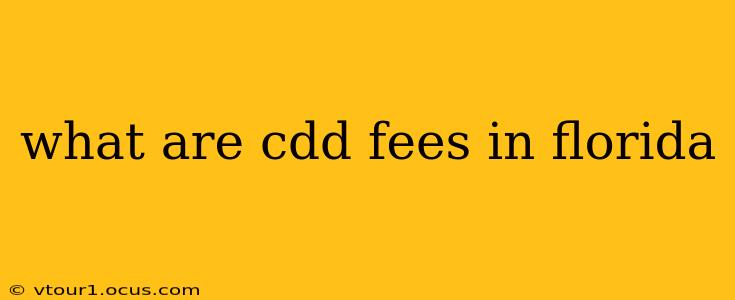CDD fees, or Community Development District fees, are special assessments levied on property owners within Florida's Community Development Districts (CDDs). These fees are used to fund the ongoing maintenance and operation of infrastructure and amenities within the CDD. Understanding CDD fees is crucial for anyone considering buying property in a Florida community governed by one. This isn't just about the initial cost; it's about long-term financial implications and the services you receive in return.
What Services Do CDD Fees Cover?
CDD fees are typically used to pay for a wide range of services and amenities, making them a key part of the overall cost of living in a CDD community. These services often extend beyond the scope of typical homeowner association (HOA) fees. Commonly covered expenses include:
- Infrastructure Maintenance: This includes upkeep of roads, bridges, drainage systems, water and sewer lines, streetlights, and other essential infrastructure elements. Think of it as the ongoing upkeep of the community's "bones."
- Amenity Maintenance: Many CDDs maintain recreational amenities such as parks, swimming pools, fitness centers, golf courses, and other community facilities. Maintaining these amenities requires ongoing staffing, repairs, and supplies.
- Debt Service: A significant portion of CDD fees might be allocated to paying down the debt incurred during the initial development of the community. This debt often covers the costs of constructing the infrastructure and amenities in the first place.
- Administrative Costs: CDDs employ staff to manage the day-to-day operations, handle finances, maintain records, and respond to resident concerns. These administrative costs are factored into the fees.
- Security: Some CDDs provide enhanced security services, such as gated entrances, patrols, or security personnel.
How Are CDD Fees Determined?
The amount of CDD fees varies greatly depending on several factors, including:
- The Size and Scope of the CDD: Larger CDDs with more extensive infrastructure and amenities will generally have higher fees.
- The Level of Amenities: Communities with more elaborate amenities will usually require higher fees to maintain them.
- The Outstanding Debt: A higher level of outstanding debt from the initial development will result in larger portions of the fees being dedicated to debt service.
- The Property's Location within the CDD: Some areas within a CDD might have different fee structures depending on the services they receive.
How Do CDD Fees Compare to HOA Fees?
It's important to understand the distinction between CDD fees and HOA fees. While both involve assessments on property owners, they cover different services:
- HOA fees typically cover maintenance of common areas within a subdivision, such as landscaping, clubhouse maintenance, and exterior building maintenance.
- CDD fees cover the larger-scale infrastructure and amenities that benefit the entire community, as outlined above. You will often pay both an HOA fee and a CDD fee when living in a community with both.
What Happens if I Don't Pay My CDD Fees?
Failure to pay CDD fees can result in significant consequences, similar to unpaid property taxes. These consequences can include liens placed on your property, affecting your ability to sell or refinance. It's crucial to understand your financial obligations before purchasing property within a CDD.
Are CDD Fees Tax Deductible?
Unfortunately, CDD fees are generally not tax-deductible as a direct expense. However, portions of the fees might be deductible if they relate to mortgage interest or property taxes on your home within the CDD. It's advisable to consult with a tax professional for specific guidance on your tax situation.
Where Can I Find More Information About Specific CDD Fees?
To find detailed information about CDD fees for a particular property or community, you should:
- Review the CDD documents: These documents, available through the CDD's management company or the county property appraiser's office, will provide a comprehensive breakdown of the fees and the services they cover.
- Contact the CDD management company: The management company will be able to answer specific questions regarding the fees and provide detailed financial information.
- Consult a real estate professional: A real estate agent familiar with the area can provide valuable insights into the CDD fees and their implications for potential buyers.
Understanding CDD fees is a critical step in the Florida home-buying process, especially in communities where these fees apply. By carefully researching and understanding these fees, potential buyers can make informed decisions that align with their financial capabilities and expectations.
